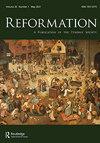Wondrous Exchange: The Economy of Salvation in the Reformation1
IF 1.1
0 RELIGION
引用次数: 0
Abstract
ABSTRACT The theme of “Conversion” is prominent in writings of Protestant reformers of the sixteenth century. Conversion is variously construed as a sudden reorientation of perspective, or, alternatively, as a gradual, ongoing process of readjustment of behavior. Change of religious orientation can be cognitive or habitual, passive or active, and can depend upon a range of moral ontological assumptions. A traditional antiphon in the Octave of Christmas invokes the language of exchange – “O admirabile commertium” – which is echoed by Jean Calvin in his reference to the Sacrament of the Eucharist as “mirifica commutatio”, “wondrous exchange.” This language harks back to the scriptural concept of covenant. This essay will explore the reformers’ employment of mercantile metaphors in their discourse of conversion. In addition to Calvin attention will be paid to Erasmus, Martin Luther, the Florentine reformer Peter Martyr Vermigli, the French Zwinglian Antoine de Marcourt, and to the Elizabethan divine Richard Hooker.奇妙的交换:宗教改革中的救赎经济
在16世纪新教改革家的著作中,“皈依”这一主题十分突出。转换被不同地解释为观点的突然重新定位,或者,作为一个逐渐的,持续的行为重新调整的过程。宗教取向的改变可以是认知的或习惯的,可以是被动的或主动的,并且可以依赖于一系列道德本体论假设。圣诞节八度音阶中传统的对唱符引用了交换的语言——“O admirabile commercium”——这在加尔文提到圣餐圣事时也得到了呼应,他说圣餐圣事是“奇妙的交换”。这种语言可以追溯到圣经中关于契约的概念。本文将探讨改革者在其皈依话语中对商业隐喻的运用。除了加尔文,我们还会关注伊拉斯谟、马丁·路德、佛罗伦萨的改革家彼得·殉道者维米利、法国的茨温廉派的安托万·德·马尔库尔,以及伊丽莎白时代的神学家理查德·胡克。
本文章由计算机程序翻译,如有差异,请以英文原文为准。
求助全文
约1分钟内获得全文
求助全文

 求助内容:
求助内容: 应助结果提醒方式:
应助结果提醒方式:


